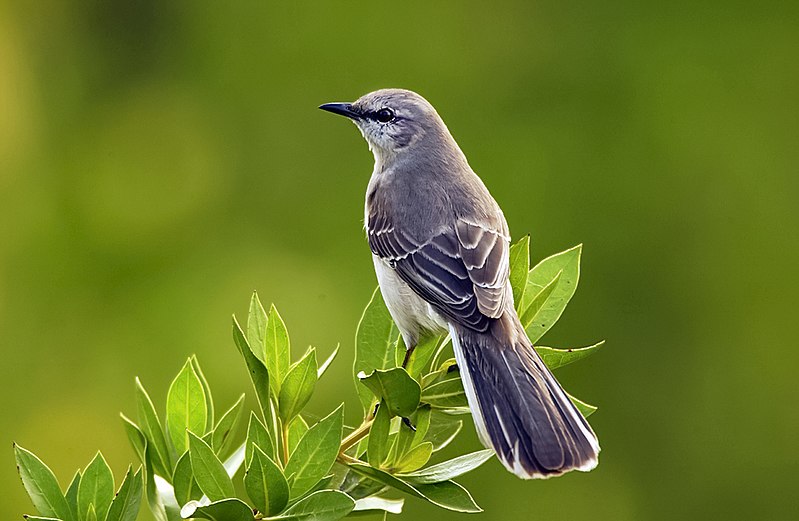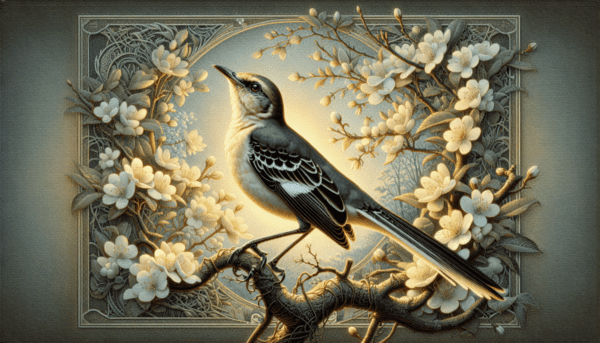 The mockingbird holds a significant place in literature and culture, often seen as a symbol of imitation, mimicry, and creativity 1. Its rich symbolic interpretation spans across historical and cultural spectrums, touching on Greek mythology and Native American folklore, where the mockingbird meaning is deeply rooted in tales of transformation and adaptability 1. This bird’s uncanny ability to mimic a wide range of sounds from its surroundings illustrates its remarkable adaptability and resourcefulness, aspects that can be viewed positively or negatively based on the narrative context 1.
The mockingbird holds a significant place in literature and culture, often seen as a symbol of imitation, mimicry, and creativity 1. Its rich symbolic interpretation spans across historical and cultural spectrums, touching on Greek mythology and Native American folklore, where the mockingbird meaning is deeply rooted in tales of transformation and adaptability 1. This bird’s uncanny ability to mimic a wide range of sounds from its surroundings illustrates its remarkable adaptability and resourcefulness, aspects that can be viewed positively or negatively based on the narrative context 1.
As we delve into mockingbird symbolism, we explore various facets of its representation, from innocence and purity to the profound power of voice 1. This article seeks to uncover the layers of meaning behind the mockingbird’s symbolism, highlighting how its presence across different cultures and epochs speaks to its enduring significance. Through analyzing its historical roots and symbolic charges, we’ll gain insight into why this bird continues to fascinate and inspire stories of protection, vigilance, and the nuanced balance of mimicry and originality 1.
The Historical Significance of Mockingbirds

The Northern Mockingbird, Mimus polyglottos, known for its exceptional ability to mimic a variety of sounds, holds a unique place in American history and culture 2. This bird, the only mockingbird species native to the United States, has been celebrated and revered across various states and cultural narratives. In the 19th century, the bird’s impressive vocal abilities made it a target for the illegal pet trade, significantly depleting its populations as individuals were captured for their singing prowess, with the finest singers fetching prices as high as $50 in 1828—a sum equivalent to over $1,300 today 2.
Renowned for its spirited defense of its territory, the Northern Mockingbird is recognized as the state bird in Arkansas, Florida, Mississippi, Tennessee, and Texas. The Texas legislature in 1927 poignantly described the mockingbird as “a fighter for the protection of his home, falling, if need be, in its defense, like any true Texan,” highlighting the bird’s symbolic representation of vigilance and bravery 2. This symbolism extends into the realms of art and science, where figures like John James Audubon, the eminent ornithologist and painter, praised the mockingbird’s musical talents. In his seminal work, Birds of America, Audubon lauded the mockingbird as “the king of song,” a bird unmatched in musical skill, which he believed was all derived from nature 2.
Further enriching its historical significance, the mockingbird’s symbolism is woven into the fabric of Greek mythology and Native American folklore, where it is often associated with intelligence and the supernatural. In some Native American cultures, the mockingbird is considered the guardian of the dead, a testament to its deep-rooted presence in cultural traditions and stories 13. This rich tapestry of historical, cultural, and natural attributes underscores the mockingbird’s enduring relevance and the multifaceted meanings it has accumulated over time.
Mockingbirds as Symbols of Innocence and Purity
In Harper Lee’s acclaimed novel “To Kill a Mockingbird,” the portrayal of mockingbirds transcends mere avian representation, embodying the profound themes of innocence and purity 4. The characters of Jem, Tom Robinson, Dill, Boo Radley, Mr. Raymond, and Scout Finch are metaphorically likened to mockingbirds, each illustrating the intrinsic goodness and unmarred purity that the bird symbolizes 4. This literary device underscores the moral message of the novel, where these characters, though varied in their social and racial backgrounds, share the commonality of being harmless to their surroundings, much like the mockingbirds that sing sweetly and expect nothing in return 5.
The narrative further intensifies this symbolism through the characters of Tom Robinson and Boo Radley. Both are depicted as emblematic mockingbirds—innocent yet shattered by their brutal encounters with societal evils 5. Their stories serve as poignant reminders of the destructive consequences of prejudice and ignorance, resonating with the novel’s central tenet that to harm a mockingbird is to perpetrate an act of senseless cruelty 7. This idea is vividly articulated by Atticus Finch and Miss Maudie, who explain that mockingbirds are benign creatures that contribute beauty to the world, and that killing them is both sinful and profoundly unjust 7.
The symbolic weight of the mockingbird reaches its zenith in the character of Scout Finch. As the young protagonist, Scout embodies the mockingbird’s spirit by challenging the entrenched prejudices of her community and striving to assess individuals based on their actions rather than societal stereotypes or appearances 6. Her journey mirrors the growth and eventual loss of innocence, a central theme encapsulated by the novel’s title, which serves as a metaphorical warning against the destruction of purity and goodness in the world 8. The recurring motif of the mockingbird throughout Harper Lee’s narrative not only enriches the text’s thematic complexity but also elevates the mockingbird to a powerful symbol of innocence, beauty, and moral righteousness 89.
Mockingbirds and the Power of Voice
Mockingbirds, celebrated for their vocal abilities, are not just songbirds but symbols of communication and self-expression. These birds are known for their remarkable skill in imitating a wide range of sounds, including those of other birds, animals, and even human-made noises 313. Their ability to mimic is not just an auditory feat but also a symbolic representation of learning, memorization, and even plagiarism, which ties deeply into their cultural symbolism of music and voice 3.
The power of the mockingbird’s voice extends beyond mere imitation. They strategically use their songs to influence their social interactions—drawing specific birds closer while keeping others at bay, showcasing a sophisticated use of voice for both attraction and manipulation 13. This nuanced control over their vocal expressions aligns with the Mockingbird Spirit Animal, which encourages individuals to find and express their truths, underlining the critical role of voice in personal expression and authenticity 13.
In spiritual and cultural contexts, the mockingbird’s voice carries deeper meanings. It is often seen as a bridge to divine guidance, offering protection and truth through its nocturnal songs, and is revered in Native American culture for its intelligence and diplomatic qualities 1113. The bird’s capacity to sing both day and night symbolizes adaptability and the continuous celebration of life, urging us to express ourselves freely and authentically, fostering self-confidence and alignment with our higher purposes 14.
Protection and Vigilance in Mockingbird Symbolism
In the realm of symbolism, mockingbirds are not merely melodious creatures but also potent symbols of protection and vigilance. Their role extends beyond nature, embedding deep cultural and spiritual significance. The Northern Mockingbird, recognized as the state bird in several U.S. states, epitomizes the intense protection of one’s home, especially noted in Texas where it is celebrated for its defensive nature 3. This bird’s protective behavior is mirrored in its social monogamy, showcasing a commitment to its partner and offspring, which is reflective of values like stability, defense, and protection 3.
Mockingbirds are also credited with the ability to communicate significant messages through their songs. In Native American culture, their nocturnal singing is interpreted as conveying important messages, which is a testament to their role in symbolic communication 11. Similarly, in Chinese culture, a mockingbird singing at night is considered an omen of good luck and prosperity, further emphasizing its protective and auspicious attributes 11.
Furthermore, the mockingbird spirit animal is revered for its vigilance and courage. Individuals who identify with the mockingbird totem are believed to exhibit a fearless defense of their homes and families, embodying the spirit of protection and courage. This spirit animal also encourages paying attention to details and using intuition, which are crucial in safeguarding one’s surroundings and loved ones 1215. The mockingbird’s presence is often seen as a deterrent against negative energies and a bearer of comfort, assuring that higher forces are looking out for us 14.
Conclusion
Through the exploration of mockingbird symbolism across various cultures, instances, and literary works, we have unearthed the deep-seated significance of this fascinating bird, showcasing its role as a powerful emblem of mimicry, creativity, and the profound power of voice. The journey from its historical roots, adorned by tales of transformation and adaptability, to its symbolic representation of innocence, purity, and moral righteousness within the narrative framework of “To Kill a Mockingbird,” emphasizes the bird’s intricate relationship with human culture and the natural world. The mockingbird’s ability to mimic a plethora of sounds is not just a testament to its remarkable adaptability but also reflects its complex significance in symbolizing communication, protection, and vigilance, resonating deeply with human values and societal norms.
The rich tapestry of meanings associated with the mockingbird, from serving as a guardian in Native American folklore to symbolizing innocence in literary contexts, underscores the bird’s enduring impact on human perception and the interpretation of nature. Its presence in mythology, literature, and as a spirit animal encourages a deeper appreciation for the nuances of voice, the importance of protection, and the virtue of vigilance, inviting readers and enthusiasts alike to reflect on the symbolic richness of the natural world. As we close this discussion, the mockingbird emerges not merely as a subject of intrigue but as an emblem of the interconnectedness of life, culture, and the enduring quest for understanding and harmony between humans and nature.
FAQs
1. What does the mockingbird symbolize in literature?
The mockingbird symbolizes innocence in literature, particularly highlighted in Harper Lee’s “To Kill a Mockingbird.” The story uses the metaphor of the mockingbird to represent innocents who are harmed by evil influences.
2. How does Atticus Finch describe the significance of mockingbirds?
Atticus Finch describes mockingbirds as creatures that only produce music for our enjoyment, without causing harm or seeking to show off. He emphasizes that it is wrong to harm these birds, symbolizing the sin of destroying pure, innocent beings.
3. What does the mockingbird represent outside of literature?
In a broader context, mockingbirds symbolize innocence in real life as well. They are seen as harmless creatures that sing joyfully, not out of malice or vanity, but simply to share their cheerful tunes.
4. What is the significance of the mockingbird according to educational resources like Quizlet?
Educational platforms like Quizlet reiterate that the mockingbird is a prominent symbol of innocence. The bird is characterized by its harmonious singing, which is viewed as a form of pure goodness, as it brings joy without causing any harm.
References
[1] – https://study.com/academy/lesson/to-kill-a-mockingbird-themes-symbols-imagery.html
[2] – https://www.audubon.org/news/10-fun-facts-about-northern-mockingbird
[3] – https://worldbirds.com/mockingbird-symbolism/
[4] – https://www.sparknotes.com/lit/mocking/symbols/
[5] – https://www.cram.com/essay/Why-Not-To-Kill-A-Mockingbird-Analysis/PCB85YHWG
[6] – https://www.quora.com/Why-did-Harper-Lee-choose-mockingbirds-to-be-her-symbol-of-innocence-when-mockingbirds-commonly-attack-people-and-destroy-gardens-Do-you-think-there-is-a-better-avian-representation-of-innocence
[7] – https://www.litcharts.com/lit/to-kill-a-mockingbird/symbols/the-mockingbird
[8] – https://www.facinghistory.org/ideas-week/what-does-it-mean-kill-mockingbird
[9] – https://www.cram.com/essay/To-Kill-A-Mockingbird-Symbolism-Essay/FK9ZCSLGR4EX
[10] – https://www.bartleby.com/essay/Essay-On-Symbolism-In-To-Kill-A-FJSXXPXFWV
[11] – https://www.whatspiritual.com/spiritual-meaning-of-mockingbird-singing-at-night/
[12] – https://www.spiritanimals.org/mockingbird/
[13] – https://whatismyspiritanimal.com/spirit-totem-power-animal-meanings/birds/mockingbird-symbolism-meaning/
[14] – https://tucsonspiritualdirection.org/spiritual-meaning/mockingbird
[15] – https://www.hep6.com/mockingbird-symbolism-facts-meaning-totem-spirit-power-animal/
[16] – https://www.bartleby.com/essay/The-Mockingbird-A-Symbol-Of-Innocence-P3K4N29CF995
[17] – https://www.birdzilla.com/learn/mockingbird-symbolism-meaning/

